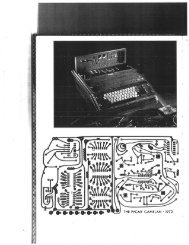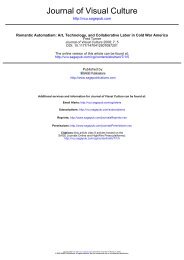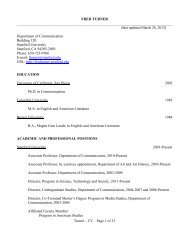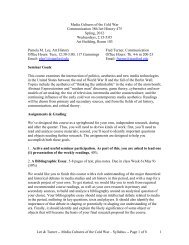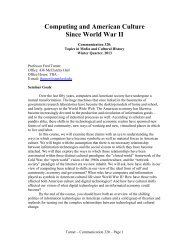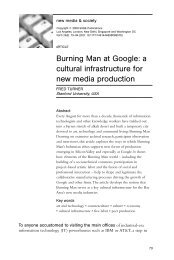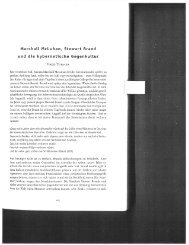The Family of Man and the Politics of Attention in ... - Public Culture
The Family of Man and the Politics of Attention in ... - Public Culture
The Family of Man and the Politics of Attention in ... - Public Culture
Create successful ePaper yourself
Turn your PDF publications into a flip-book with our unique Google optimized e-Paper software.
<strong>Public</strong> <strong>Culture</strong><br />
l<strong>in</strong>ed <strong>in</strong> <strong>the</strong> Ford Foundation’s annual report <strong>of</strong> 1950. Writ<strong>in</strong>g <strong>in</strong> <strong>the</strong> dom<strong>in</strong>ant<br />
idiom <strong>of</strong> <strong>the</strong> day, <strong>the</strong> foundation trustees argued that all <strong>of</strong> humanity faced a<br />
choice between two modes <strong>of</strong> liv<strong>in</strong>g. “One is democratic,” <strong>the</strong>y wrote, “dedicated<br />
to <strong>the</strong> freedom <strong>and</strong> dignity <strong>of</strong> <strong>the</strong> <strong>in</strong>dividual. <strong>The</strong> o<strong>the</strong>r is authoritarian, where<br />
freedom <strong>and</strong> justice do not exist, <strong>and</strong> human rights <strong>and</strong> truth are subord<strong>in</strong>ated<br />
wholly to <strong>the</strong> state.” 31 From a distance <strong>of</strong> sixty years, it is easy to layer <strong>the</strong>se<br />
words onto <strong>the</strong> global map <strong>of</strong> <strong>the</strong> Cold War <strong>and</strong> so to see <strong>the</strong>m as promot<strong>in</strong>g a new<br />
American hegemony. But it is harder to recognize that with<strong>in</strong> that work, <strong>the</strong>re was<br />
ano<strong>the</strong>r, antistatist impulse. <strong>The</strong> trustees <strong>of</strong> <strong>the</strong> Ford Foundation articulated this<br />
impulse with characteristic white- collar restra<strong>in</strong>t: “Human welfare,” <strong>the</strong>y wrote,<br />
“requires tolerance <strong>and</strong> respect for <strong>in</strong>dividual social, religious, <strong>and</strong> cultural differences.<br />
. . . With<strong>in</strong> wide limits, every person has a right to go his own way <strong>and</strong> to<br />
be free from <strong>in</strong>terference or harassment because <strong>of</strong> nonconformity” (7).<br />
To make such <strong>in</strong>dividual freedom a reality, <strong>the</strong> trustees advocated a mode <strong>of</strong><br />
control that, follow<strong>in</strong>g Michel Foucault, we now call governmentality. Democracy<br />
was not simply a design for state government, <strong>the</strong>y expla<strong>in</strong>ed. “It is a way <strong>of</strong> total<br />
liv<strong>in</strong>g, <strong>and</strong> to choose it means to choose it aga<strong>in</strong> <strong>and</strong> aga<strong>in</strong>, today <strong>and</strong> tomorrow,<br />
<strong>and</strong> cont<strong>in</strong>uously to reaffirm it <strong>in</strong> every act <strong>of</strong> life” (17). <strong>The</strong> job <strong>of</strong> government<br />
was not to direct <strong>the</strong> specific choices <strong>of</strong> citizens but ra<strong>the</strong>r to set a pr<strong>in</strong>cipled<br />
framework with<strong>in</strong> which <strong>the</strong>y might make <strong>the</strong>ir own choices. For <strong>the</strong> trustees,<br />
such a system was <strong>the</strong> opposite <strong>of</strong> <strong>the</strong> hierarchies <strong>of</strong> fascism <strong>and</strong> communism, <strong>in</strong><br />
which people were slaves or masters. In <strong>the</strong> more egalitarian democratic system,<br />
<strong>the</strong>y wrote, “pr<strong>in</strong>ciples become actions” (9). <strong>The</strong> job <strong>of</strong> <strong>the</strong> Ford Foundation <strong>in</strong><br />
<strong>the</strong> com<strong>in</strong>g years would be to promote such pr<strong>in</strong>ciples — <strong>and</strong>, by implication,<br />
such a mode <strong>of</strong> control — worldwide.<br />
D’Harnoncourt <strong>in</strong> his letter to Ford described Steichen’s planned exhibition<br />
as a model <strong>of</strong> such a democratic world. Steichen’s project, he wrote, would be a<br />
“demonstration <strong>of</strong> this basic concept <strong>of</strong> a free society.” <strong>The</strong> exhibition was “not to<br />
be a propag<strong>and</strong>a show” but was to <strong>of</strong>fer a “dramatic statement <strong>of</strong> faith <strong>in</strong> which<br />
our beliefs will be told by means <strong>of</strong> <strong>the</strong> faces, actions <strong>and</strong> achievements <strong>of</strong> free<br />
people from all over <strong>the</strong> world.” 32 In o<strong>the</strong>r words, while Steichen’s show would<br />
have a message <strong>in</strong> <strong>the</strong> general sense, it would not seek to impose its views on <strong>the</strong><br />
audience. Ra<strong>the</strong>r, it would attempt to build a framework <strong>of</strong> pr<strong>in</strong>ciples, draw visitors<br />
<strong>in</strong>to that framework, <strong>and</strong> <strong>the</strong>re allow <strong>the</strong>m to see <strong>the</strong>mselves as free <strong>in</strong>dividu-<br />
31. Ford Foundation, “Report <strong>of</strong> <strong>the</strong> Trustees <strong>of</strong> <strong>the</strong> Ford Foundation,” September 27, 1950, 16.<br />
32. René d’Harnoncourt, draft <strong>of</strong> “Letter to Henry Ford, II,” n.d., 2, <strong>in</strong> René d’Harnoncourt<br />
Papers, ser. 7, folder 85, Museum <strong>of</strong> Modern Art Archives, New York.<br />
74



